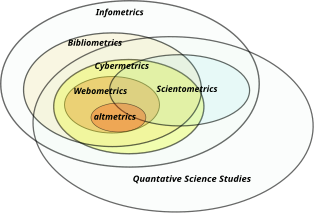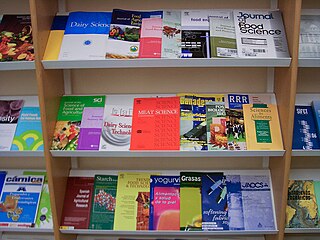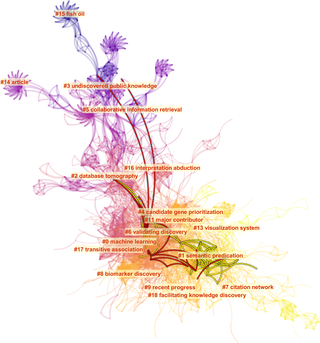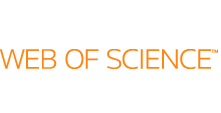
In academic publishing, a scientific journal is a periodical publication intended to further the progress of science, usually by sharing findings from research with readers. They are normally specialized based on discipline, with authors picking which one they send their manuscripts to.

Information science is an academic field which is primarily concerned with analysis, collection, classification, manipulation, storage, retrieval, movement, dissemination, and protection of information. Practitioners within and outside the field study the application and the usage of knowledge in organizations in addition to the interaction between people, organizations, and any existing information systems with the aim of creating, replacing, improving, or understanding the information systems.
CiteSeerX is a public search engine and digital library for scientific and academic papers, primarily in the fields of computer and information science.

An academic journal or scholarly journal is a periodical publication in which scholarship relating to a particular academic discipline is published. Academic journals serve as permanent and transparent forums for the presentation, scrutiny, and discussion of research. They nearly universally require peer review or other scrutiny from contemporaries competent and established in their respective fields. Content typically takes the form of articles presenting original research, review articles, or book reviews. The purpose of an academic journal, according to Henry Oldenburg, is to give researchers a venue to "impart their knowledge to one another, and contribute what they can to the Grand design of improving natural knowledge, and perfecting all Philosophical Arts, and Sciences."

Bibliometrics is the use of statistical methods to analyse books, articles and other publications, especially in scientific contents. Bibliometric methods are frequently used in the field of library and information science. Bibliometrics is closely associated with scientometrics, the analysis of scientific metrics and indicators, to the point that both fields largely overlap.
Citation analysis is the examination of the frequency, patterns, and graphs of citations in documents. It uses the directed graph of citations — links from one document to another document — to reveal properties of the documents. A typical aim would be to identify the most important documents in a collection. A classic example is that of the citations between academic articles and books. For another example, judges of law support their judgements by referring back to judgements made in earlier cases. An additional example is provided by patents which contain prior art, citation of earlier patents relevant to the current claim.
The United States National Agricultural Library (NAL) is one of the world's largest agricultural research libraries, and serves as a national library of the United States and as the library of the United States Department of Agriculture. Located in Beltsville, Maryland, it is one of five national libraries of the United States. It is also the coordinator for the Agriculture Network Information Center (AgNIC), a national network of state land-grant institutions and coordinator for the U.S. Department of Agriculture (USDA) field libraries.

Google Scholar is a freely accessible web search engine that indexes the full text or metadata of scholarly literature across an array of publishing formats and disciplines. Released in beta in November 2004, the Google Scholar index includes peer-reviewed online academic journals and books, conference papers, theses and dissertations, preprints, abstracts, technical reports, and other scholarly literature, including court opinions and patents.

EBSCO Information Services, headquartered in Ipswich, Massachusetts, is a division of EBSCO Industries Inc., a private company headquartered in Birmingham, Alabama. EBSCO provides products and services to libraries of many types around the world. Its products include EBSCONET, a complete e-resource management system, and EBSCOhost, which supplies a fee-based online research service with 375 full-text databases, a collection of 600,000-plus ebooks, subject indexes, point-of-care medical references, and an array of historical digital archives. In 2010, EBSCO introduced its EBSCO Discovery Service (EDS) to institutions, which allows searches of a portfolio of journals and magazines.
The Journal of the Association for Information Science and Technology is a monthly peer-reviewed academic journal covering all aspects of information science published by Wiley-Blackwell on behalf of the Association for Information Science and Technology. The journal publishes original research and rapid communications, as well as book reviews and announcements of the association. Occasional special issues appear with contents focused on a single topic area.

SciELO is a bibliographic database, digital library, and cooperative electronic publishing model of open access journals. SciELO was created to meet the scientific communication needs of developing countries and provides an efficient way to increase visibility and access to scientific literature. Originally established in Brazil in 1997, today there are 16 countries in the SciELO network and its journal collections: Argentina, Bolivia, Brazil, Chile, Colombia, Costa Rica, Cuba, Ecuador, Mexico, Paraguay, Peru, Portugal, South Africa, Spain, Uruguay, and Venezuela.

The Virtual Health Library (VHL) is an institution that employs the World Wide Web to "improve access to reliable, locally relevant information [on health and health sciences] for health-professionals, researchers, academics, educators, decision makers, and the general public". BVSes are organized under the auspices of the Pan-American Health Organization and the World Health Organization.

Frederick Gridley Kilgour was an American librarian and educator known as the founding director of OCLC, an international computer library network and database. He was its president and executive director from 1967 to 1980.

The Social Sciences Citation Index (SSCI) is a commercial citation index product of Clarivate Analytics. It was originally developed by the Institute for Scientific Information from the Science Citation Index. The Social Sciences Citation Index is a multidisciplinary index which indexes over 3,400 journals across 58 social science disciplines – 1985 to present, and it has 122 million cited references – 1900 to present. It also includes a range of 3,500 selected items from some of the world's finest scientific and technical journals. It has a range of useful search functions such as ‘cited reference searching’, searching by author, subject, or title. Whilst the Social Sciences Citation Index provides extensive support in bibliographic analytics and research, a number of academic scholars have expressed criticisms relating to ideological bias and its English-dominant publishing nature.
Scholarly communication involves the creation, publication, dissemination and discovery of academic research, primarily in peer-reviewed journals and books. It is “the system through which research and other scholarly writings are created, evaluated for quality, disseminated to the scholarly community, and preserved for future use." This primarily involves the publication of peer-reviewed academic journals, books and conference papers.

The Web of Science is a paid-access platform that provides access to multiple databases that provide reference and citation data from academic journals, conference proceedings, and other documents in various academic disciplines. It was originally produced by the Institute for Scientific Information. It is currently owned by Clarivate.
Dr. Thomas D. Wilson has been an active contributor to the world of information science since 1961, when he received his Fellowship from the British Library Association. His research has focused on information management and information seeking behaviour.

The National Library of Economics is the world's largest research infrastructure for economic literature, online as well as offline. The ZBW is a member of the Leibniz Association and has been a foundation under public law since 2007. Several times the ZBW received the international LIBER Award for its innovative work in librarianship. The ZBW allows for access of millions of documents and research on economics, partnering with over 40 research institutions to create a connective Open Access portal and social web of research. Through its EconStor and EconBiz, researchers and students have accessed millions of datasets and thousands of articles. The ZBW also edits two journals: Wirtschaftsdienst and Intereconomics.
The Maghreb Virtual Science Library(MVSL)(la Bibliothèque numérique des sciences du Maghreb المكتبة العلمية الافتراضية المغاربية ) provided full-text access to thousands of science and engineering journals and databases to researchers in the Maghreb via digital library portals. It was a project funded by the U.S. Department of State Bureau of Oceans & International Environmental and Scientific Affairs, and is implemented by CRDF Global along with IMIST (Institut Marocain de l'Information Scientifique et Technique), LibHub, Research4Life, and JSTOR.











